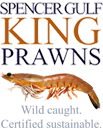The definition of free range is WILD Harvest, no anti-biotics or artificial colors.
Prawns grow in coastal prawn farms, "disease can run amuck."
Australians are increasingly aware of the importance of healthy eating habits. A well balanced, nutritious diet and regular exercise are vital factors in a healthy lifestyle.
SEAFOOD IS LOW IN FAT
Seafood averages less than 2% fat. For slimmers, seafood is all good news. All seafood is low in kilojoules, with fewer kilojoules than even the leanest meat or chicken. Of course with seafood you don't need to trim any fat. Just grill, barbecue, bake, steam, poach, or microwave seafood to keep a low kilojoule count.
FISH IS LOW IN CHOLESTEROL
Cholesterol is an essential part of all living animal tissue. But levels of cholesterol can be too high if we eat too much saturated fat. Seafood has very little fat of any kind and what it does have is mostly unsaturated fat. Eating fish two or three times a week can help lower cholesterol and reduce the risk of heart disease.
SEAFOOD IS HIGH IN PROTEIN
Seafood is an excellent source of top quality protein, and compares favourably with meat or chicken.
SEAFOOD IS HIGH IN VITAMINS & MINERALS
Seafood is an excellent source of many important minerals, including iodine, zinc, potassium and phosphorus. It is also rich in many vitamins, especially the B group.
OMEGA 3 FATTY ACIDS
Omega-3s are a type of polyunsaturated fat and are essential nutrients that play many critical roles in our bodies. Just like minerals and most vitamins, our body cannot make them.
Long chain Omega-3s are found in oily fish, non-oily fish and shellfish, and to a lesser extent in meats and eggs. Long chain Omega-3s are used effectively in the body. DHA (a long chain Omega-3 fatty acid) is a major building block of the brain, and the retina in the eye is very concentrated in DHA. Other vital organs, such as the heart, are rich in long chain Omega-3s.
Research has also shown that regular consumption of Omega-3 fatty acids can reduce the risk of developing macular degeneration (MD). The MD Foundation encourages people to eat fish regularly to ensure that their intake of Omega-3s is adequate. For information on macular degeneration click here or visit the Foundation's website at www.mdfoundation.com.au
For more detailed information on Omega-3s, visit the Omega-3 Centre's website at www.omega-3centre.com
Melicertus Latisulcatus
PRODUCT SPECIFICATIONS
- Wild Origin
AVAILABILITY
- The catching season is March - June and November - December. The exact dates in this period are determined by the moon phase and stock assessments.
- Frozen stock is available all year round.
Energy 420kj (100cals) Protein 24g Fat 0.1g Saturated fat 0.1g Omega 3 fat 120mg Carbohydrate 0 Sodium 1.8mg Zinc 1.8mg Iron 1.6mg Vitamin E 2.9mg














